Imitation of Life Blu-ray Movie
HomeImitation of Life Blu-ray Movie 
Universal Studios | 1934 | 111 min | Not rated | No Release Date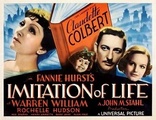
Price
Movie rating
7.2 | / 10 |
Blu-ray rating
| Users | 0.0 | |
| Reviewer | 3.5 | |
| Overall | 3.5 |
Overview
Imitation of Life (1934)
Bea Pullman and her daughter, Jessie, have struggled to make ends meet since Bea's husband died. Delilah Johnson volunteers to work as Bea's housekeeper in exchange for a room for herself and her daughter, Peola. Bea creates a successful business from Delilah's pancake recipe, and the two become wealthy. As the years pass, however, problems appear in their relationships with their daughters. Ashamed of her mother's race (and her own), Peola seeks a new life by passing for white. Bea's love for her daughter is tested when she and Jessie fall for the same man.
Starring: Claudette Colbert, Warren William, Rochelle Hudson, Ned Sparks, Louise BeaversDirector: John M. Stahl
| Romance | Uncertain |
| Drama | Uncertain |
Specifications
Video
Video codec: MPEG-4 AVC
Video resolution: 1080p
Aspect ratio: 1.35:1
Original aspect ratio: 1.37:1
Audio
English: DTS-HD Master Audio 2.0 Mono (48kHz, 24-bit)
Subtitles
English SDH, French, Spanish
Discs
50GB Blu-ray Disc
Single disc (1 BD)
Playback
Region A (B, C untested)
Review
Rating summary
| Movie | 4.0 | |
| Video | 4.0 | |
| Audio | 3.0 | |
| Extras | 2.5 | |
| Overall | 3.5 |
Imitation of Life Blu-ray Movie Review
Miss Bea and Mammy Delilah
Reviewed by Michael Reuben April 12, 2015Fannie Hurst's 1933 novel, Imitation of Life, was an unlikely property to be turned into one movie, let alone two, because, despite its popularity, it dealt with a touchy subject in America: race relations. Especially under the Hays Code, which expressly prohibited motion pictures from depicting intimate relations between members of different races, a film whose plot involved a bi-racial character so light-skinned that she could pass for white was treading on dangerous ground. But Carl Laemmle, Jr., who took over Universal Studios in 1928, was a notorious risk-taker (which eventually cost him his position). It was Laemmle who acquired Hurst's novel for the studio and produced the first filmed version in 1934, after persuading Universal's competitor, Paramount, to lend him their star, Claudette Colbert. The product of a white Jewish author based in New York City, Hurst's novel was controversial even in its time, both praised and attacked, sometimes by the same person, for a depiction of African-Americans that some readers found condescending and others saw as a critique. The same split characterizes reactions to the film adaptations, especially the 1934 version, which hews more closely to Hurst's original storyline. Co-star Louise Beavers was criticized for playing a stereotypical "mammy" character who ministered to every need of Colbert's white "mistress", but Beavers was too good an actress to remain confined within the stereotype. Seizing upon every opportunity to provide glimpses into her character's inner life, Beavers created more than what was on the page. And as the actress tartly replied to her critics, she'd rather play a maid than be one. Imitation of Life begins deceptively with what appears to be a universal story about mothers and daughters, but it quickly reveals that such stories aren't so universal after all. All relationships are mediated by the time, place and society in which they are established, and even a mother's love for her daughter cannot escape such larger forces. "You got to learn to take it", says Louise Beavers' Delilah to her unfortunate daughter, and behind that observation lies a tragic recognition that there is nothing a mother can do to ease the pain, because it's their shared heritage.
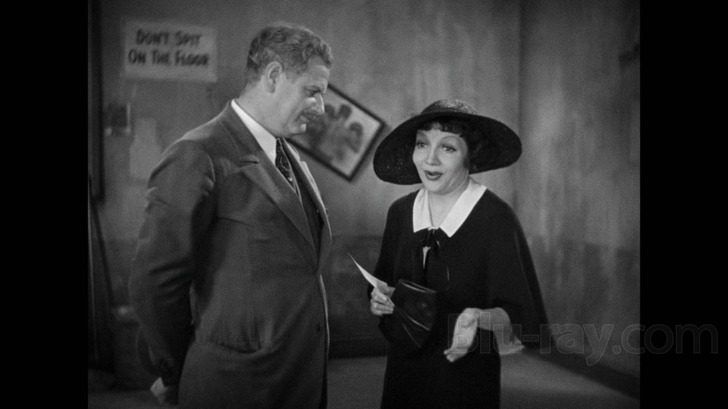
Consistent with the Depression-era mentality in which Hurst wrote her novel, the 1935 adaptation centers on Bea Pullman (Colbert), the widow of a salesman and mother of a daughter, Jessie, who is two years old when the film opens (and played by "Baby Jane" a/k/a Juanita Quigley). Barely a step ahead of her landlord and everyone else to whom she owes bills, Bea is bravely trying to carry on her husband's trade, which was the sale of pancake syrup. Chance introduces her to Delilah Johnson (Beavers), an African-American mother of a four-year-old daughter, Peola (Sebie Hendricks as a child), who is seeking work as a maid and will accept room and board as compensation, as long as she can keep Peola with her. "Miss Bea" and Delilah reach an agreement, and a life-long friendship is born. The relationship becomes more than friendship, when Bea discovers that Delilah has a secret family recipe for superb pancakes. This inspires Bea to open a pancake emporium on the Atlantic City boardwalk, initially as a shop for selling syrup. The extended sequence in which Bea wheedles, cajoles and flirts with the landlord and various trademen who supply renovations and fixtures are the kind of light comedy at which Claudette Colbert excelled. Bea names the shop after Delilah and promotes it with a huge sign featuring her smiling face. It's so successful that it eventually spawns a nationwide brand, Aunt Delilah's Pancake Flour. (Any similarity to "Aunt Jemimah" is purely intentional.) The company's manager is Elmer Smith (Ned Sparks), a dryly practical businessman who walked into the shop one day and advised Bea to "box it!" Ten years after opening her boardwalk restaurant, Bea has become so wealthy that she's moved herself, Delilah and their children to a Manhattan townhouse. (Jessie is now played by Rochelle Hudson and Peola by Fredi Washington.) But the change in material circumstances affects the two young women very differently. Jessie attends boarding school, has acquired the poise and self-confidence of a well-bred young lady and is considering college. The fair-skinned Peola, who "takes after" her light-skinned father, is in open revolt against her identity and her family. Ever since she was a girl, she has tried to "pass" as white, only to be found out whenever people discover that Delilah is her mother. Now Peola is changing her name and pretending not to know Delilah in an effort to get jobs for which a black girl could not be hired. She is furious at her mother for ruining her life and anguished over the part of her that still feels connected to Delilah. The situation can only end tragically. The 1935 version of Imitation of Life dwells at some length on a subplot carried over from Hurst's novel in which Bea Pullman and Jessie fall out over conflicting romantic attachments to the same man, Steve Archer (Warren William), a friend of Elmer Smith. It's as if author Hurst wanted to show that race isn't the only thing that can come between a mother and daughter. But this development feels separate from the rest of the story (and is toned down from the novel). The film's emotional center in the latter half is Peola's estrangement from Delilah, because it is one that can never be healed. Embracing her mother would mean accepting less than a full life in America of the 1930s, and Peola cannot do so. Key elements of Imitation of Life may seem ridiculous in their overt racism, especially Delilah's portrayal as a simple, generous, self-sacrificing soul who, when offered the opportunity to move into her own home with her share of the proceeds from Aunt Delilah's Pancake Flour, insists on remaining with Bea Pullman as her loyal servant. The character was criticized for typifying the stereotype of the "good Negro" who must be "guided" by white people, a common myth used to justify the exploitation of slaves before the Civil War and of sharecroppers after it. But there is an "eye of the beholder" element to the 1935 script (a product of almost a dozen writers, most uncredited), as well as to John M. Stahl's direction and, above all, to Beavers' portrayal of Delilah, who may be doing just as much "passing" as her daughter. By the end of the film, it is obvious that Delilah has lived an entirely different life, separate and apart from the Pullman household, one of which Bea Pullman was unaware. How much of the "mammy" personality that Bea Pullman knew was the real Delilah? How much was an imitation? Questions like these might not have occurred to white audiences in 1935, but I suspect that black audiences got the message. What Peola wants to escape is a lifetime of self-effacement, of bowing and scraping, of "knowing your place" even when you've earned much better through your own achievements. For Delilah, the only "better" place she can imagine is the afterlife, which is why she asks "Miss" Bea to set aside all her profits from the business for a first-class funeral.
Imitation of Life Blu-ray Movie, Video Quality 
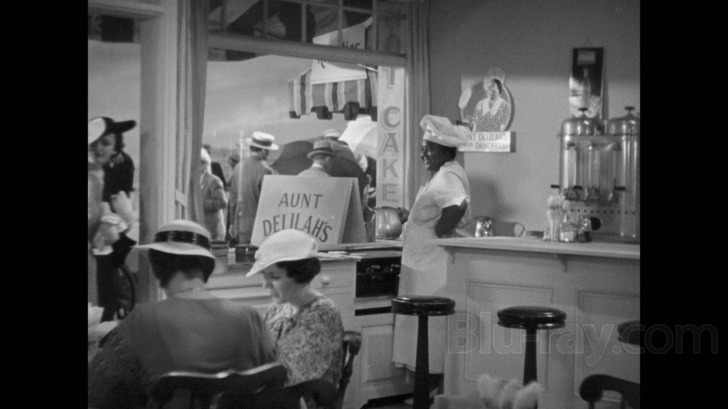
Despite being placed on a single Blu-ray disc with the 1959 version of Imitation of Life, the 1934 adaptation, with beautiful black-and-white photography by Merritt B. Gerstad (A Night at the Opera), looks exceptional in this 1080p, AVC-encoded presentation from Universal. Since the studio does not typically provide information about source materials or transfers, one can only judge by the results, which approach (although they don't quite equal) the best B&W Warner transfers from this era. Detail is plentiful, black levels and contrast appear to be correct, and the shades of gray have been delineated with sufficient accuracy to give the image a sense of depth. A fine and natural grain pattern is readily visible without becoming obvious or intrusive, and the image does not appear to have suffered from Universal's reflex habit of applying any artificial sharpening. The average bitrate of 22.998 Mbps isn't generous, but it appears to have been sufficient for a B&W film with little action and large "windowbox" bars. Artifacts were not an issue.
Imitation of Life Blu-ray Movie, Audio Quality 
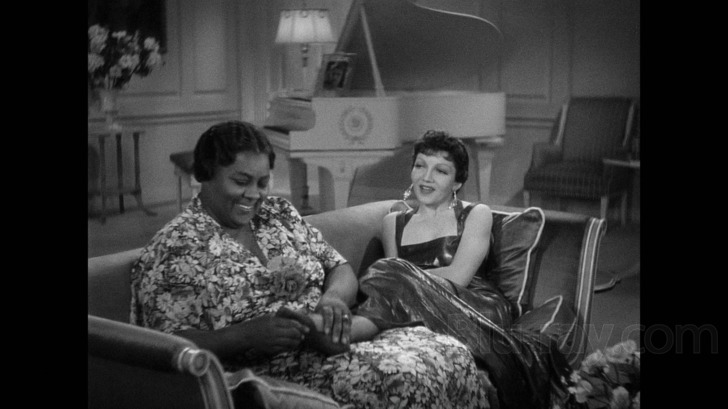
The original mono soundtrack has been encoded as lossless DTS-HD MA 2.0, with identical left and right channels. It sounds fine, given the age of the soundtrack. The dialogue is clear, as are the sound effects. (The film was nominated for an Oscar for its sound recording.) The score by Heinz Roemheld (Yankee Doodle Dandy ) is used sparingly, which gives it much greater impact when it does appear. Within the limits of the dynamic range of which the then-current technology was capable, it sounds quite good.
Imitation of Life Blu-ray Movie, Special Features and Extras 
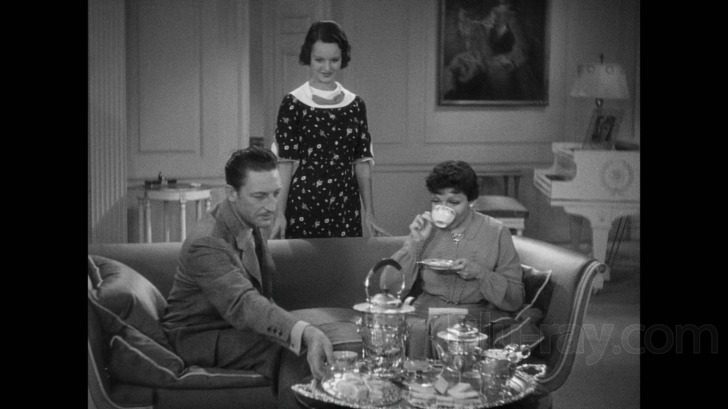
The extras first appeared on Universal's 2008 two-disc DVD set of Imitation of Life, which featured both the 1934 and 1959 versions.
- Commentary with African-American Cultural Scholar Avery Clayton: What's here is interesting, but Clayton's commentary is spotty with long periods of silence. He focuses on the film's place both in the history of Hollywood's treatment of race and in American society in general. He also explores themes of motherhood and class in films of the Thirties, all of which are reflected in Claudette Colbert's portrayal of Bea Pullman.
- Theatrical Trailer (480i; 1.37:1; 1:14): This special-purpose trailer focuses on the performances by Louise Beavers and Fredi Washington and was obviously intended for African-American markets.
Imitation of Life Blu-ray Movie, Overall Score and Recommendation 
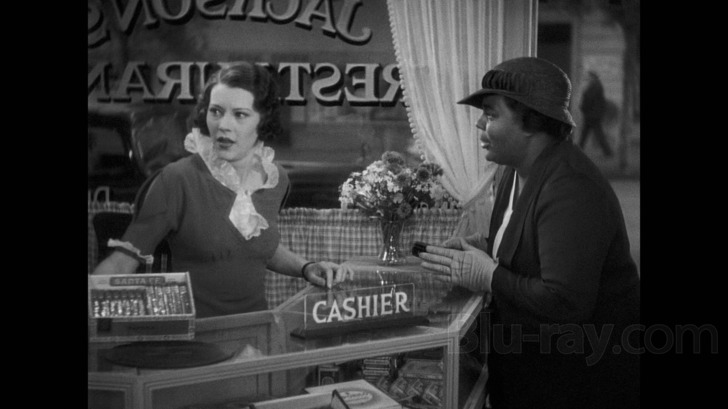
Director John M. Stahl's 1934 Imitation of Life is much more literal and "square" than the more-admired and studied adaptation directed by Douglas Sirk in 1959, but that very lack of artifice is one of the film's great strengths. By hewing more closely to Hurst's original novel and eschewing the directorial filigree for which Sirk was noted, Stahl's version preserves the focus on the story's core dilemma, which is all about race. Sirk may have been the more inventive cinematic artist, but Stahl was a more effective social realist, even within the strictures of the Hays Code and the prevailing mores of the time. Highly recommended.
Similar titles
Similar titles you might also like
(Still not reliable for this title)

Imitation of Life
1959

The Disappearance of Eleanor Rigby
Includes "Him", "Her", and "Them" Cuts
2014

Dodsworth
Warner Archive Collection
1936

Wild River
Fox Studio Classics
1960

One Day
2011

A Star Is Born
Restored Edition | Warner Archive Collection
1937

Sadie McKee
Warner Archive Collection
1934

Far from Heaven
2002

The Bitter Tea of General Yen
1933

Becky Sharp
1935

Bird of Paradise
1932

Grand Hotel
1932

Learning to Drive
2014

Enough Said
2013

Finding Neverland
2004

Belle
2013

Harlow
1965

Ask the Dust
2006

When Harry Met Sally...
30th Anniversary Edition
1989

A Letter to Three Wives
Fox Studio Classics
1949
